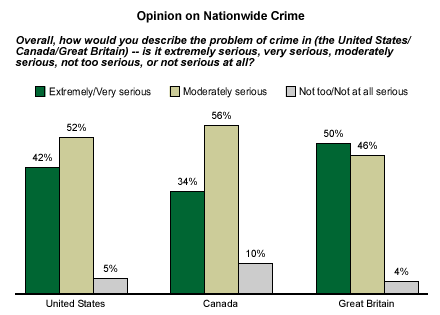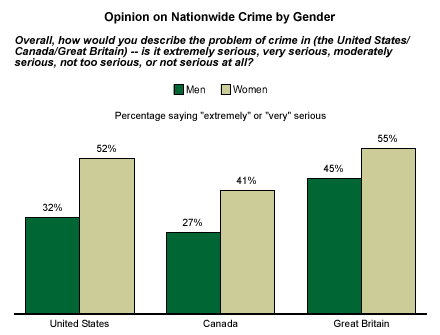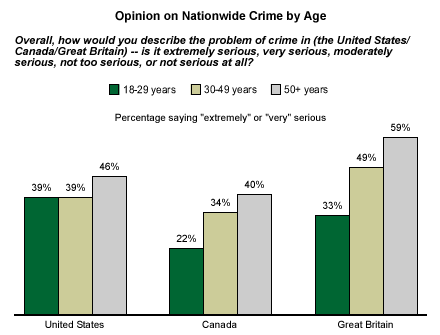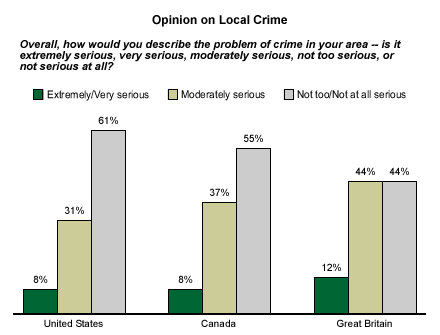American gun laws are far less strict than those in Canada and Great Britain, and the United States' largest cities are often portrayed as havens for crime in movies, television shows, and even video games. Despite the more relaxed gun laws and this stereotype, recent Gallup polling in the United States, Canada, and Great Britain* shows Americans are not the most pessimistic of the three nationalities when asked about the crime problems in their countries.
Gallup asked survey respondents in the United States, Canada, and Great Britain to describe how serious the crime problem is in their respective country. Forty-two percent of Americans classify the U.S. crime problem as "extremely" or "very" serious, putting Americans smack between Canadians and Britons. Barely more than a third (34%) of Canadians feel crime is at least very serious in Canada, while 50% of Britons feel there is a very or extremely serious crime problem in their country.

Older People, Women Most Worried About Nationwide Crime
In each country, women are significantly more likely than men to think the nationwide crime problem is extremely or very serious. In Canada, 41% of women express this level of concern about crime, as do 27% of men. Slightly more than half (52%) of American women feel crime is an extremely or very serious problem in their country, compared with 32% of American men. British men and women are a little closer in their assessments of crime in Great Britain -- 55% of women and 45% of men describe the crime problem as at least very serious.

Regardless of nationality, concern about crime in one's country also seems to increase with age. Just 22% of Canadians between the ages of 18 and 29 feel the crime problem in Canada is at least very serious, but that number increases to 34% among 30- to 49-year-olds and 40% among those aged 50 and older. Britons follow a similar pattern -- a third (33%) of 18- to 29-year-olds feel crime is at least a very serious problem, as do 49% of 30- to 49-year-olds and 59% of those 50 and older. The age gap is narrower in the United States; 39% of both 18- to 29-year-olds and 30- to 49-year-olds feel the problem is extremely or very serious, compared with 46% of Americans aged 50 and older.

Why do women and older people have more negative perceptions of nationwide crime? "There is a great deal of research to support the hypothesis that public perceptions about crime are largely based on media portrayals of crime, and in particular the reporting of crime on the local and national news," says Senior Gallup Poll Editor Lydia Saad. "Separately, some studies have shown that this media effect is most pronounced with women viewers." Saad also points out that older people tend to watch more news than do younger people. "The older you are, the more you watch. Thus, older Americans would be predicted to have more negative perceptions of crime than do younger adults."
Crime in Local Areas
Opinion about crime in the nation as a whole is one thing; perception of crime in the specific area in which one lives seems to be quite another. When asked to describe the crime problem "in your area," residents of all three countries express a more upbeat outlook. Only 8% of Americans, 8% of Canadians, and 12% of Britons feel crime is an extremely or very serious problem in the area where they live. Sixty-one percent of Americans, 55% of Canadians, and 44% of Britons describe the crime problem in their area as "not too serious" or "not at all serious."

The demographic differences are far less prominent on the "in your area" question. For example, in Great Britain, 13% of women and 11% of men feel the crime problem in their area is extremely or very serious. In the United States, 8% of both men and women feel the crime problem is at least very serious; in Canada, 10% of women vs. 5% of men. The differences are equally narrow by age group in each country.
It's unclear why the gender and age gaps are stronger in people's assessments of national crime than they are for local crime. Saad hypothesizes that "people are more able to make an informed judgment based on experience relative to local crime, but rely more exclusively on media information for their perception of national crime."
*Results in the United States are based on telephone interviews with 1,012 national adults, aged 18 and older, conducted Oct. 11-14, 2004. For results based on the total sample of national adults, one can say with 95% confidence that the maximum margin of sampling error is ±3 percentage points. The survey was conducted by Gallup USA.
Results in Canada are based on telephone interviews with 1,004 national adults, aged 18 and older, conducted Dec. 6-12, 2004. For results based on the total sample of national adults, one can say with 95% confidence that the maximum margin of sampling error is ±3 percentage points. The survey was conducted by Gallup Canada.
Results in Great Britain are based on telephone interviews with 1,009 national adults, aged 18 and older, conducted Dec. 1-21, 2004. For results based on the total sample of national adults, one can say with 95% confidence that the maximum margin of sampling error is ±3 percentage points. The survey was conducted by Gallup UK.
